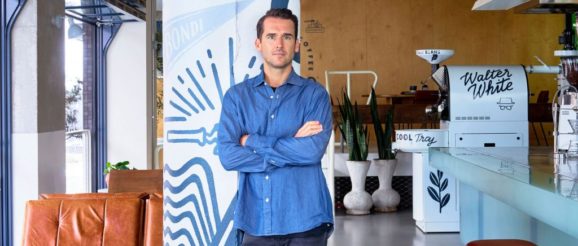Jeremy Bull: “Maintain a mindset to continue the innovation of your team,” – Australian Design Review

“Stay positive and protect your capital so that you can explode out of the gates when the market finds its new normal” is Alexander & CO. principal Jeremy Bull’s advice to practices dealing with the coronavirus outbreak.
In the first of our Working from Home series, where we speak to Australian interior designers and architects about how they’re handling the effects of COVID-19, the IDEA 2020 judge says the industry needs to stay long term focused.
“Review your cost base immediately, remove all surplus costs and anything that was only short term,” he says.
“We will all get out of this, some in better shape than others, but some will thrive. Protect your people at all costs. Look after your community, do your best for them. Talk, talk, talk and give what you can.”
Young people are finding it the hardest to adjust
This week, Alexander & CO. closed its Sydney studio and transitioned to working entirely from home. Surprisingly, Bull says his youngest staff members are struggling the most.
“Our immediate team is reconciling the effects of project volatility, along with new modes of communication and solitary work environments,” he says.
“But it’s been a huge challenge particularly for our younger team members who are more acclimatised to human contact and hands on mentoring.”
Bull says while the practice has spent much of the week engaged in “business triage”, putting together its COVID-19 company policy and communicating with it client base and broader team, the exercise has had positive outcomes too.
“For so long, we have talked about working flexibility and never had the field conditions to truly test the paradigm. Now that it’s forced upon us, it seems a time for great innovation without an alternate.”
“It is all a little trial and error, but under continuous refinement daily”
Working from home might seem foreign to architects and designers, but Bull says it is possible, albeit with a few initial speed bumps.
“We have found that effective video conferencing and connectivity to screen sharing with tools that can capture hand drawing allow a meeting to flow fairly unchanged,” he says.
“Our team is resourced with laptops and iPads, and our software is well equipped to screen share through applications like Google Hangouts. We have upped our all-hands dialogues to try and keep our whole team connected and one-to-one with new information as it surfaces. This is along with individual team huddles and project or problem specific ones.”
Part of that transition process has involved being even more open and transparent with clients, says Bull.
“So far we have faced very little project lag, but one of our core values is transparency and we have little concern communicating issues even when they aren’t always good news,” he says.
“My mandate to our team is to stay highly available, communicating with our clients daily or as close to that as possible. I think being here and being open is possibly the best we can do to help.”
“We have a daily leadership huddle in place to manage project pivots and subsequent changes in our resourcing strategies”
As prepared as Alexander & CO. is, Bull acknowledges the practice has experienced some upheaval following the coronavirus outbreak. Its not alone, a recent Australian Bureau of Statistics survey found almost half of local businesses have already been adversely affected.
Bull says hospitality projects along with retail fit-outs have both substantially frozen, while broader residential and commercial sectors have continued unaltered at this stage.
Projects in construction also seem to have missed the first wave of impact, says Bull, although he is wary that either supply chain impacts or legislative changes may affect these too.
“In the broadest terms, our clients who are working on long term projects, with their own capital, may even be the beneficiaries of a substantial upside as access to subcontractors and materials become lower in cost later this year.”
From the point of view of managing these changes, Bull says the practice sees them as “both dynamic and volatile” and has daily leadership meetings to address and respond.
“Amie our remarkable general manager is tasked with keeping us mobilised on the key priorities.”
The future of the industry is bright
“I think there is tremendous opportunity for this to mark a shift in our ideas about capitalisation and globalisation.”
Bull encourages practices to use this opportunity to innovate their working and capital models, and take things less for granted, including the undiscussed environmental impact of our interconnectivity.
“I think there is a chance to reflect upon scale and quantity versus quality,” he adds.
“To really drill into how communities can be more sustainable, caring and supportive at a scale that manages this well, but we will see!”
